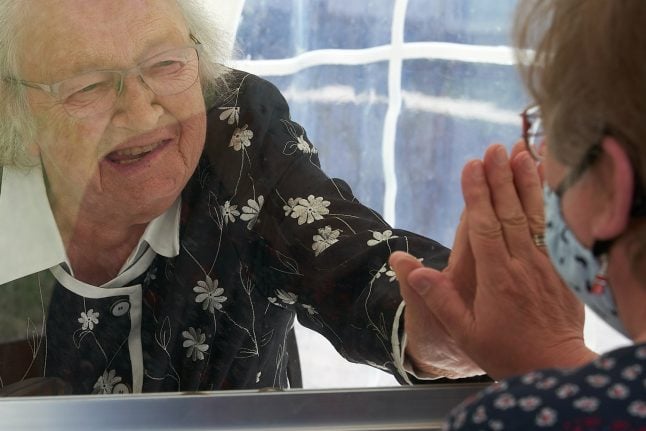In mid-March Germany began shutting down much of public life and from March 23rd people were urged to only leave their homes for essential reasons.
However, since April 20th, the lockdown has been gradually lifted. This week more businesses and facilities have been reopening, although contact restrictions and social distancing measures remain in place.
READ ALSO: What's the latest on coronavirus and what do I need to know?
These photos, taken by DPA, show life around Germany during this time.
In some states pubs (known as Kneipen) and restaurants are preparing to open. In Mainz, Janine Geibel-Emden, of the traditional pub or Kneipe “Zur Andau”, stands behind a glass guard at the counter on May 11th. The pub in the city centre wants to reopen in compliance with coronavirus hygiene regulations.

Ulrike Haase adjusts a mouthguard on a doll in the restaurant at 'Hotel Haase' in Laatzen, Lower Saxony on May 12th. Due to corona requirements, seats have to be left free in restaurants. The Hotel Haase wants to use dolls so the restaurant does not look empty.

Guests sit outside at tables in front of the restaurant “Salon Schmitz” in Cologne on May 11th.

Gyms are beginning to reopen in Germany. The first state to allow them to open is North Rhine-Westphalia. At this gym in Cologne, a worker disinfects a machine, while a gym-goer works out wearing a face mask in the next image. Both photos were taken on May 11th.


An employee and customer at the tattoo studio “Mommy I'm Sorry” in Stuttgart on May 11th. Tattoo studios have been allowed to open in Baden-Württemberg since May 11th under certain conditions.

Tamara and Frank sitting with their daughter Marie on the North Sea beach of Harlesiel in Lower Saxony on May 10th. Regions are planning to restart the tourist industry in the coming weeks.

Elisabeth Djata, resident at the AWO elderly people's centre in Heinsberg, North Rhine-Westphalia, receives a bouquet of flowers from her grandson on May 10th. Now people in nursing homes are allowed one regular visit, under certain conditions.

A health care worker gives a thumbs up at the corona ward in the Municipal Hospital Dresden on May 11th.

Church-goers attend a service at the Heilgeistkirche in Stralsund, Mecklenburg-Western Pomerania on May 10th. Church services are allowed in Germany again with social distancing measures in place.

Passersby enjoy a spontaneous concert on Merianplatz in the Nordend district of Frankfurt am Main on May 10th.

People playing volleyball in Berlin on May 10th. Non-contact sports are allowed in Germany once again.




 Please whitelist us to continue reading.
Please whitelist us to continue reading.
Member comments